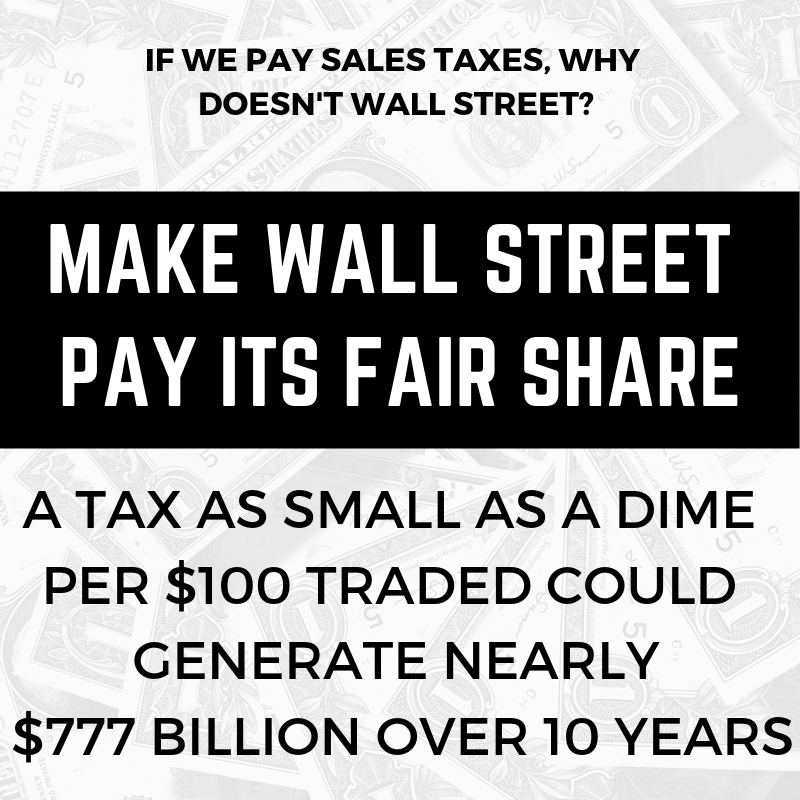The Wall Street Tax Act Would Crack Down on Dangerous High-Speed Trading and Reduce Inequality

Taxing millionaires and billionaires in order to fund ambitious programs for a more just society with less inequality has been a hot issue in recent weeks. Between high-profile proposals such as Sen. Warren’s proposed wealth tax and Rep. Ocasio-Cortez’s plan to substantially raise the top marginal tax rate, high-profile proposals to correct our unjust inequality have been getting plenty of media attention and have been the topic of much public debate.
Part of the reason for for that is that the list of problems that need tackling in this nation seems to grow by the minute: teachers are protesting the lack of adequate funding in their schools, children are facing the threat of unsafe drinking water and roads in such disrepair potholes are damaging vehicles. Federal tax dollars can and should be part of the solution to addressing these and other obstacles facing Americans and to minimizing economic inequality everywhere. That’s why it’s fantastic to see the huge amount of public support for policies that would sharply increase taxes on millionaires and billionaires. We should be thinking big when it comes to these proposals.
But unrigging the tax system means more than taxing the superrich or undoing the corporate giveaways in the 2017 tax law. The tax debate also must focus on making Wall Street high rollers pay their fair share by putting a sales tax on financial transactions like stock, bond and derivative trades. That’s why Public Citizen applauds Sen. Brian Schatz (D-Hawaii) and Sen. Chris Van Hollen (D-Md.) as well as Rep. Peter DeFazio (D-Ore.) and Rep. Alexandria Ocasio-Cortez and colleagues for today introducing the Wall Street Tax Act of 2019. This brand new legislation proposes a financial transaction tax (FTT) that would apply a 0.1 percent fee (10 cents out of every $100) on the trading of stocks, bonds and derivatives. We were joined by 60 other organizations from faith to labor to climate groups that endorsed the Wall Street Tax Act legislation introduced today.
Passing the Wall Street Tax Act would have the dual benefits of raising revenue to pay for the kinds of ambitious programs we need to create a more just society, and also curbing bad behavior on Wall Street. Specifically, the bad behavior that an FTT would check is high-speed trading.
High-frequency trading is the superfast computer trading that has overtaken the market. It was high-speed trading that contributed to the market instability we have seen over the past few months. Because the profit from high-speed trading comes from being able to make trades a split second faster than the competition, putting a tiny tax on trading will steer activity away from these investment strategies that narrowly chase short-term gains over long-term value creation.
In addition to cracking down on this dangerous high-speed trading, the proposal’s revenue generation is nothing to sneeze at either. According to government estimates, it would raise nearly $777 billion over 10 years. After being in place for a few years, a Wall Street tax at a rate of 0.1 percent would bring in more than $100 billion per year. In one year, that could pay for more than a million teaching, clean energy or infrastructure jobs. It could fund a year of more than 11 million Head Start spaces, health care for more than 42 million low-income kids, or health care for 9 million veterans. Or, that amount could pay the way to four-year colleges for more than 3 million students. Moreover, it could be put toward mitigating climate change or investing in rebuilding the infrastructure our society desperately needs. The list of possible investments is endless.
Given the many benefits from taxing financial transactions, it’s not surprising that around 40 other countries have them in place. In fact, the U.S. already has an (albeit very small) trading fee in place that funds some of the operations of the U.S. Securities and Exchange Commission. This would just put in place a more robust, expanded version of an existing tax.
It was more than a decade ago when Wall Street recklessness crashed the economy, but some hardworking families are still struggling to regain their footing. Yet banks are making record profits and cashing in from the generous tax cuts they received—all while buying back their own stock.
Standing up to the financial industry will take vision and commitment. Hopefully, all members of Congress will see the potential and join Sen. Schatz, Sen. Van Hollen, Rep. DeFazio, Rep. Ocasio-Cortez and their colleagues in calling to use Wall Street’s dime to rebuild Main Street.